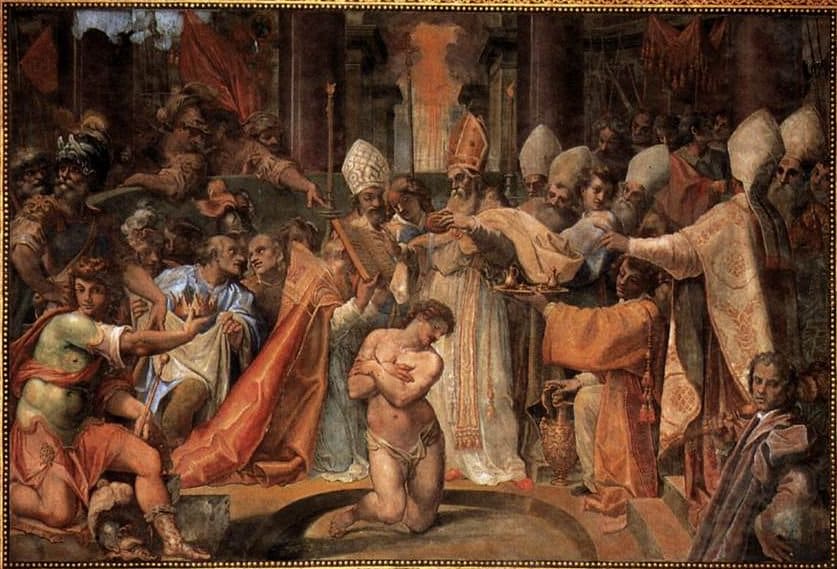SoundCloud Ultimate Error: Could not display your SoundCloud track - Error code (401).
For centuries, the Catholic Church has relied on theological words and terms to teach the basics of the Faith. Sadly, in many quarters, from pulpits to classrooms, these ancient terms have been abandoned as “old-fashioned” remnants of a “pre-conciliar” Church. Many Catholics no longer hear traditional Catholic vocabulary, so it’s no wonder they don’t know what these words mean. That’s very unfortunate because these terms convey essential truths about the spiritual life. What are some of these terms? I came up with a number of them. (No doubt, there are more.)
In no particular order, here is a list of traditional Catholic terms and their definitions. Thanks to Dr. Ludwig Ott’s outstanding Fundamentals of Catholic Dogma, which I quote liberally here.
- Grace: “The act of the application of the fruits of the Redemption to the individual man is called Justification or Sanctification. The fruit of the Redemption itself is called grace.” Grace is “a supernatural gift, which God, of his benevolence, bestows on rational creatures for their eternal salvation.”
- Actual grace: “Actual grace is a temporary supernatural act of God directed towards the spiritual power of man for the purpose of moving him to a salutary act.”
- Habitual grace: “Habitual grace is a constant supernatural quality of the soul which sanctifies man intrinsically and makes him just and pleasing to God (sanctifying grace).”
- Sanctifying/Supernatural grace [State of Grace] “is a participation in the divine nature.”
- The formal effects of Sanctifying grace: “the sanctification of the soul, the beauty of the soul, friendship with God, kinship with God, indwelling of the Holy Spirit.”
- “The grace by which we are justified [Sanctifying Grace] may be lost, and is lost by every grievous [mortal] sin.”
- Sacrament: “The Roman Catechism defines a Sacrament as ‘a thing perceptible to the senses, which on the ground of Divine institution possesses the power both of effecting and signifying sanctity and righteousness (=Sanctifying grace)’. Thus there are three elements in the concept of sacrament: a) the external, that is a sensibly perceptible sign of sanctifying grace: b) the conferring of sanctifying grace: c) the institution by God or, more accurately, by the God-Man Jesus Christ.”
- Matter and Form of Sacrament: “The outward sign of the sacraments is composed of two essential parts, namely, the thing and word. The thing is either a physical substance (water, oil) or an action perceptible to the senses (penance, marriage). The word is, as a rule, the spoken word.”
- The Eucharist and Real Presence: “The Eucharist is that Sacrament, in which Christ, under the forms of bread and wine, is truly present, with His Body and Blood, in order to offer himself in an unbloody manner to the Heavenly Father, and to give Himself to the faithful as nourishment for their souls.” (Emphasis added)
- Original sin: “Original sin consists in the deprivation of grace caused by the free act of sin committed by the head of the race [Adam].” . . . “In the state of Original sin man is deprived of sanctifying grace and all that this implies, as well as the preternatural gifts of integrity.” . . . “Baptism effects…the eradication of sins, both original, and in the case of adults, all personal, mortal or venial sins.”
- Mortal sin: From the Catechism of the Catholic Church: “Mortal sin destroys charity in the heart of man by a grave violation of God’s law; it turns man away from God, who is his ultimate end and his beatitude, by preferring an inferior good to him.” . . . “Mortal sin, by attacking the vital principle within us – that is, charity – necessitates a new initiative of God’s mercy and a conversion of heart which is normally accomplished within the setting of the sacrament of reconciliation. For a sin to be mortal, three conditions must together be met: ‘Mortal sin is sin whose object is grave matter and which is also committed with full knowledge and deliberate consent’.”
- Venial sin: “Venial sin allows charity to subsist, even though it offends and wounds it.”
- Mortal sin: From the Catechism of the Catholic Church: “Mortal sin destroys charity in the heart of man by a grave violation of God’s law; it turns man away from God, who is his ultimate end and his beatitude, by preferring an inferior good to him.” . . . “Mortal sin, by attacking the vital principle within us – that is, charity – necessitates a new initiative of God’s mercy and a conversion of heart which is normally accomplished within the setting of the sacrament of reconciliation. For a sin to be mortal, three conditions must together be met: ‘Mortal sin is sin whose object is grave matter and which is also committed with full knowledge and deliberate consent’.”
- Indulgences: “By an indulgence is understood the extra-sacramental remission of the temporal punishments of sin remaining after the forgiveness of the guilt of sin. This remission is valid in the sight of God, and it is granted by the Church out of Her treasury of satisfaction.”
- Communion of Saints: “The members of the Kingdom of God on earth and in the other world sanctified by the redeeming grace of Christ are united in a common supernatural life with the Head of the Church and with one another.”
- Theological Virtues: “In justification, man receives simultaneously with the remission of sins all three virtues of faith, hope and charity, which are infused by Jesus Christ in him in whom He is implanted.” ~Council of Trent
- Sacramentals (holy water, scapulars, blessed objects): “Sacramentals are things or actions which the Church uses in a certain imitation of the Sacraments, in order, in virtue of her prayers, to achieve effects, above all in a spiritual nature.”



